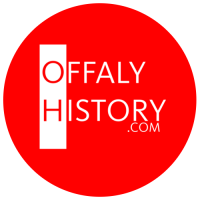In March 1914 the Foresters Hall played host to meeting called organise the Irish Volunteers…
A new insight into some Tullamore families.
Overview
In mid-December we publish a book by Maurice Egan, ‘Merchants, Medics, and the Military Commerce and Architecture’ provides an exciting insight on the social history of Ireland from 1875 to 1925, as seen through the lives of influential Irish families. We are now taking orders and expect to be able to fill them from 13 December. You can order online or call to Offaly History at Bury Quay and at Midland Books in High Street, Tullamore.
Fig 1. ‘Merchants, Medics, and the Military: Commerce and Architecture’ by Maurice G Egan
Fig 2. The magnificent Malachy Scally’s Drapery edifice, Colmcille Street, Tullamore from around 1914.
Published by Offaly Historical and Archaeological Society’s Esker Press and authored by Maurice Egan this volume is available in hardback including never seen before exhibits, many of them in colour. It is a must for those with a local, national, and international interest in social history and social justice. This is an excellent read and retails at €24.99.
Introduction
Between 1875 and 1925, a tumultuous period in Irish history, many provincial families made significant sacrifices in the areas of social justice, infrastructure development and community upliftment. Who were they? What ever became of them? What did they manage to achieve? Where did these family members move to? How did they help change the face of Irish social history?
Researching this fifty-year period and uncovering how certain Tullamore families helped change the course of local and in some cases international history, Maurice Egan has discovered the significant roles families played in social reform. The fascinating stories that have emerged shine a bright light on the enduring impact they made.
‘Maurice Egan’s accomplishment in Merchants, Medics and the Military is that he has identified an important strand of Irish social history that has heretofore been largely unexplored. The stories of the revolutionaries and the land reformers are well documented. The organisation of the urban working classes and the empowerment of the agricultural tenantry have had many narrators. But there has been little focus on the mercantile classes that were at the centre of commercial and social life in the regional towns that remain to this day at the centre of our society…… and he has done them a service in this volume, ensuring that they will have their place in the formation of the Ireland we now live in.’
Conor Brady, (An Irish journalist, novelist, and academic, he is a former editor of The Irish Times).
Fig 2. The McFadden home on O’Moore St, by Fergal McCabe May 1973. Courtesy McFadden private collection.
Growing up in 1960s Tullamore, one was quite aware of those who lived down the town and indeed lasting friendships were made with many of those families with time spent in some of their magnificent homes. All the houses from Cormac Street down to O’Connor Square had residents, many living there for generations. Picture that to today’s precarious situation and the decay beset some of these former residential town homes, many of them architectural gems.
‘Whether it was family rivalry, noblesse oblige or simply good marketing, the merchant princes of Tullamore had very good taste in architecture. In the heyday of their ascendancy and success in the first half of the twentieth century Egan, Williams and Scally families built many business premises and family homes of significant architectural merit which are now integral elements of the heritage of the town.’
Fergal MacCabe, (A Tullamore born architect, town planner, and award-winning topographical artist who now lives in Glasthule, Co. Dublin).
These family contributions to the upliftment of local communities, the provision of piped potable water and gas, the arrival of electricity and first building of social housing, was pioneering. Their deliberations left an enduring positive impact wherever they conducted interactions throughout the Midlands of Ireland.
Published in 2020, Maurice Egan’s first book titled: ‘The Egans of Moate and Tullamore: Business and Politics’, co-authored with family member David Egan, provided many wonderful and interesting researched stories of how one influential family helped change the course of Irish history. But of course, they were not alone as many mercantile families, many medical families, many families whose members joined different military regiments also made a significant impact during these difficult, and fast changing years in Irish history.
Who might find these social histories of interest? It is my wish that local families can find interest and remember how their family members helped forge lasting change in the evolving independence and ultimate establishment of the Irish Republic. Historians too will be intrigued with the new research and how the stories connect to those already written about Irish statesmen. Researchers themselves can tap into the social context of the day and how influential families and personalities stood against repression and agitated for reform and universal franchise. Makers of documentaries may conclude there is enough material here for them to close out long fingered projects of this era.
About the author:
Maurice Egan was born in Tullamore and attended the Christian Brothers School.
He is a retired beverage industry executive and is chairman of P & H Egan (Tullamore) Limited, the brand owner of Egan’s Irish Whiskey. He resides in Johannesburg and has a keen interest in social history from 1850 to 1925.
If you wish to contribute a blog on an Offaly History topic email us, [email protected]. We are now working on 2022 and will need about 100 articles. So get started
